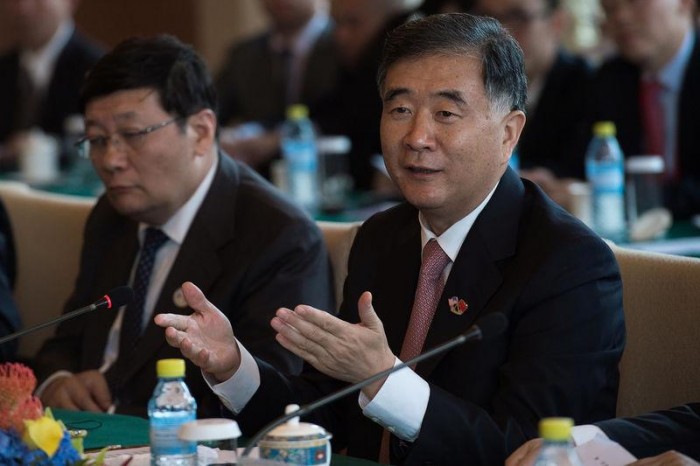Media Report

- Reuters reports: "China will submit next week its 'negative list' offer of sectors that would remain off-limits to U.S. investment in a U.S.-China bilateral investment treaty (BIT), Vice Premier Wang Yang said on Monday. Wang made the comments in opening remarks to the economic track of the Strategic and Economic Dialogue talks in Beijing. U.S. officials have said a negative list that greatly reduces the number of off-limits sectors is critical to reaching a deal....'The United States stands ready to advance the ongoing bilateral investment treaty negotiations provided that China is prepared to move forward in negotiating a high-standard and mutually beneficial agreement,' Lew said....Lew said earlier he hoped the two countries would make progress on market access issues as well as the problem of excess industrial capacity in China during this week's talks."
- The New York Times reports: "The Chinese finance minister jabbed back on Monday at complaints from his American counterpart that China's glut of factories making mountains of steel, aluminum and other products was overwhelming foreign markets and makers. The finance minister, Lou Jiwei, suggested that foreign officials should curb their complaints about industrial production surpluses because their governments had cheered on China's investment spree during the global financial crisis that began in 2008. That spree helped create the production gluts now worrying policy makers in Beijing and, increasingly, around the world....The talks, set to end on Tuesday, also cover foreign policy and international security tensions, such as North Korea's nuclear weapons and China's territorial disputes with neighbors in the South China Sea. There was no sign of either side shifting its position in those disputes in the meeting's opening remarks by President Xi Jinping and Secretary of State John Kerry."
- The Wall Street Journal reports: "Disagreements in the mainly closed-door talks among dozens of senior officials this week were on display Monday. U.S. Treasury Secretary Jack Lew took Beijing to task for its regulatory barriers on foreign businesses and urged it to cut the rampant excess capacity in steel and other industries that is having 'a distorting and damaging effect on global markets.'...As for agreement, China is encouraging U.S. companies to invest in energy-efficient projects through a 20 billion yuan ($3 billion) green finance fund, according to officials with knowledge of the matter....This year's strategic and economic dialogue, or S&ED as the annual talks are known, is the last for the Obama administration, leaving little time for major initiatives. With China policy—especially on trade—already a topic in the presidential election, Chinese analysts expect the next U.S. president, whether Donald Trump or Hillary Clinton, is likely to start out with a harder line toward Beijing."
Calendar
- 2016-06-05 Maritime Spat Simmers as U.S., China Talk
- 2016-06-03 U.S. to Urge China to Put More Pressure on North Korea
- 2016-06-02 China tells U.S., don't let allies set South China Sea policy
- 2016-06-01 President Trump would hand the world to China
- 2016-05-31 China to 'pressure' U.S. on maritime issues, paper says
- 2016-05-30 For many Chinese migrants, the lure of the city is fading
- 2016-05-29 China Default Chain Reaction Threatens Products Worth 35% of GDP
- 2016-05-27 G-7 leaders express concern over South China Sea, urge peace
- 2016-05-27 G-7 leaders express concern over South China Sea, urge peace
- 2016-05-26 China warns G7 not to ‘escalate tensions’ in Asia
News
- The New York Times China Pushes Back Against U.S. Complaints of Industrial Overcapacity
- Reuters China to submit 'negative list' for U.S. investment treaty talks next week
- The Wall Street Journal U.S.-China Talks Show Limits of Cooperation
- Bloomberg Business China's Debt Load Is (Much) Higher Than Previously Thought, Goldman Says
- The Washington Post U.S. chides China on steel glut, treatment of foreign companies at annual talks
- The New York Times Negotiating Tariffs With China as Britain Considers Surveillance Laws
- The Wall Street Journal Long Shadow Hangs Over China's Banks
- The Washington Post China repeats refusal to abide by South China Sea ruling
- BBC News US warns China on steel overcapacity
- Reuters Taiwan 'won't recognize' any Chinese air defense zone over South China Sea
- Bloomberg Business China's Xi Opens U.S. Talks With Plea Not to Fear Disputes
- TIME A Top Admiral Says China Has 'No Fear' Over Disputes in the South China Sea
- BBC News Record showing for China on 'power women' list
Commentary
- The Wall Street Journal: China Real Time Early Look: China's 'Lukewarm' Economy in May
- The National Interest China's Mighty Missile Arsenal: The 21st-Century Kamikaze?
- Foreign Policy Firings, ousters, hot water, and the arrogance of the Chinese foreign minister
- The Diplomat Reading From the 'Script' on the South China Sea Issue
- Foreign Policy: The Cable SitRep: China Reacts Angrily to Defense Secretary Carter's Comments
- The National Interest The Curious Love-Hate Relationship between China and North Korea
- The Diplomat South China Sea: US Sounds Warning Against a Potential Chinese ADIZ
